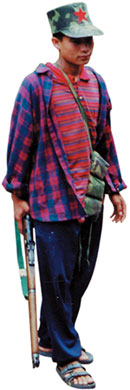 Two names top the list of those missing since the start of the Maoist "people's war". Dev Raj Joshi, former Nepali Congress MP from Bajura may have already been killed after being abducted by Maoists in early July. Danda Pani Neupane is the most prominent missing Maoist. He disappeared in May 1999, and the government says Neupane is not on its list of people detailed or killed.
Two names top the list of those missing since the start of the Maoist "people's war". Dev Raj Joshi, former Nepali Congress MP from Bajura may have already been killed after being abducted by Maoists in early July. Danda Pani Neupane is the most prominent missing Maoist. He disappeared in May 1999, and the government says Neupane is not on its list of people detailed or killed. As the third round of talks get underway, both sides are demanding the release of prisoners and information on the missing. The government wants the Maoists to release 189 people, including 69 policemen. The Maoists want to know where their own 69 missing comrades are as a precondition to further dialogue.
The human rights organisation INSEC says Maoists have abducted 547 people so far of which 107 are still missing and government has taken 227. The whereabouts of 130 are still unknown. There's someone else who is keeping count: the International Committee of the Red Cross (ICRC) in Geneva. Spokesman Darcy Christen told us his numbers are similar, adding: "It is a complicated issue and has to be addressed immediately if you are to be in a position to have credible talks."
So, either the possible killings have to be admitted (and regretted) by both sides, or the whereabouts of those still missing made public. "There are people we have not seen on our subsequent visits," Christen added. "It will be a political decision for Kathmandu to say what happened to them." Maoists have a greater responsibility since they have said they respect the Geneva Conventions.
ICRC delegations have been visiting Nepali prisons since late 1998. Although they have no access to Maoist detention camps, the rebels have not disrupted their work. ICRC says its priority is to visit those under Maoist detention.
The ICRC has been trying to set up an office in Nepal since 1998 but does not have a "headquarters agreement" with government yet. Sources in the foreign ministry admit there have been delays and say that's because of "administrative problems." Unofficially, one reason for the delay was letting ICRC in would mean recognising the Maoist internal conflict. The official line until some months ago was that this was a "law and order problem".
"We have expertise in tracing people but are not into mediation," says Jean Jacques Bovay, head delegate of ICRC in Nepal. The ICRC also offered to play the role of a neutral intermediary, but the government opted for Nepali human rights "facilitators." ICRC's role in Nepal will become more important in the coming days, especially if the talks break down and the conflict escalates. It would then be providing medical help to the injured on both sides. And that can only happen if its official status is clarified, which could happen as early as next week, a foreign ministry source told us.


